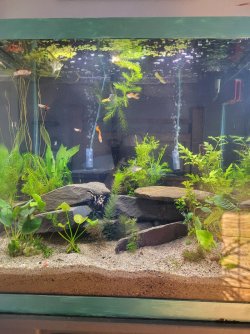ChasingFish
Fish Fanatic
Thanks for your replies! Yeah I don't claim to be an expert, but I like the idea of a low tech, low effort tank - so long as water quality is good. Question I wonder if the experts know...do those other allelo(?) hormones/chemicals whatever dissipate naturally over time, like some gases or when they interact with the other stuff in the tank? It's a big chemistry experiment really.Welcome! I am with you on the deep substrate and lots of plants. My Sumatra tank doesn't even have a filter, just a tiny pump to push things around. I do water changes simply because it makes sense to me. Living things put lots of chemicals into the water besides the big three (nitrate, nitrite, ammonia), chemicals that plants use to inhibit other plants; chemicals that animals use to communicate with each other (there's a name for all those but I can't remember at the moment; just woke up from a nap and the tea hasn't kicked in yet, sorry). Test kits don't pick that stuff up, but they can build up. What effect that has, if any, probably depends a lot on the exact fish and plants you keep. Water changes are a safety policy against bad things building up into harmful concentrations.
I like keeping my tanks as natural as possible, and I used to think that water changes weren't natural. Then it occurred to me that natural water bodies have a constant influx of new water from springs, snowmelt, rain runoff. Water changes in an aquarium simulate this. Fish tend not to live in stagnant bodies of water, so water changes actually seem more natural.
All that said, I know there are people out there who swear by the no-change method. I'm fairly open minded about it. But I don't really see any reason for it.
A progress pic on my 50 gal tank. I currently have guppies, otos, two angelfish, moved two of the beta females from the 75 gal community tank over (we think they're older, and the other two are more aggressive so they seem happier here), & some diamond tetras. I also have a vampire shrimp (rarely) and a bamboo shrimp (occasionally see). It's not the final setup as the guppies will be moved over to my breeding tanks eventually.



